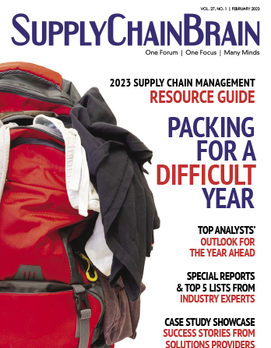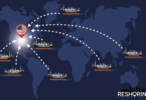
Home » A ‘Food Rescue’ App Finds a New Logistics Partner
Case Study
A ‘Food Rescue’ App Finds a New Logistics Partner

June 13, 2019
Jasmine Crowe first became aware of the enormous amounts of food that were going to waste at local restaurants in Atlanta while she was feeding hungry people every two weeks out of her own kitchen. The realization caused her to launch Goodr, a “food rescue app.”
That was in 2017, at the same time that meal-delivery services such as Uber Eats and Postmates were starting to penetrate the Atlanta market. “People like us can get food delivered from anywhere,” she says. “I wondered why there was nothing to get food to people in need.”
The problem extends far beyond Atlanta. The inability of the food ecosystem to address hunger in America has become “a national epidemic,” Goodr says. Each year, it notes, meal preparers waste more than 72 billion pounds of edible food — even as 42 million people suffer from “food insecurity.”
Crowe’s idea was to build an app that relies on blockchain technology to track surplus prepared food from source to destination. Goodr establishes relationships with both donors and non-profits who distribute food to the hungry. It displays an inventory of all available food within a given area, then arranges for pickup and delivery of whatever’s available on a given day.
The app recaps the contents of each order, then creates a donation letter on the customer’s dashboard, calculating the charitable tax deduction as well as how much water and carbon dioxide was used to supply the food.
Goodr didn’t actually launch until 2018, but it took off quickly. Already it operates in six major U.S. markets: Atlanta, Raleigh-Durham, N.C., Washington, D.C., Chicago, Philadelphia and Los Angeles. Users of the app include Delaware North, Pivotal Foods, Concessions International, and the National Football League. (Goodr was the official food partner of the NFL at Super Bowl LIII in Atlanta.)
The key to the venture’s success is efficient logistics. Goodr links to multiple vehicles and drivers within a particular area, ranging from private cars to 18-wheelers. (The latter was needed when a grocery store’s refrigeration system died.) Initial partners have included the same-day delivery provider INPAX, and truck-sharing service Truxx. It has also handled some deliveries by itself.
As it sought to scale up its operations nationally, Goodr was in need of additional logistics partners. It found one when Crowe received a message on LinkedIn from Valerie Metzker, head of business development with Roadie.
Roadie is an “on-the-way” delivery service that crowdsources transportation, tapping drivers and vehicles that happen to be traveling in the direction that a package needs to go. It works with a number of major retail brands, including Walmart, The Home Depot, Macy’s, Delta Airlines and United Airlines (for delivery of lost luggage), AT&T, and Bed Bath and Beyond. In all, it delivers within more than 11,000 cities and towns in the U.S.
Metzker contacted Crowe after reading an article quoting her saying that feeding the hungry was more of a logistics problem than a supply problem. With its national footprint, Metzker thought Roadie could be of assistance to Goodr and its ambitious plans for expansion.
Crowe was receptive to the offer, although fully engaging with Roadie became a six-month process that included a number of pilots. She was especially drawn to the vendor’s technology, which enables the transmission of pickup requests to Roadie at the same time Goodr gets word of the availability of a shipment. Roadie also receives notice of the need for specialized transport, such as refrigeration or air conditioning.
Metzker says Goodr represented a new kind of business for Roadie, although the latter’s services had previously been called on to provide relief supplies to the Baton Route, La. area following the 2016 floods. As such, Roadie is no stranger to items for which rapid delivery is critical.
Other food-transportation providers are “very technology-light,” Crowe says, adding that Roadie helps Goodr get shipments to those in need more quickly, while allowing for expansion into new markets.
Goodr plans to increase operations to 10 cities by the end of this year, and 20 by 2020. Crowe says she’ll rely on Roadie in any city in which the provider operates. The company is currently in more than 85 major markets, Metzker notes, calling on approximately 120,000 drivers who range from soccer moms to gig workers and retirees.
Goodr claims to have handled nearly 2 million pounds of food since launching its app, and saved donors some $8m in tax benefits. But Crowe thinks the company can do a lot more, with Roadie’s help.
“We have been able to accelerate our food rescue program to service communities in multiple cities, thanks to Roadie’s ability to scale delivery to the demand of any market,” she says. “This partnership offers Goodr a faster, easier way to bring its programs to any city nationwide.”
RELATED CONTENT
RELATED VIDEOS
Subscribe to our Daily Newsletter!
Timely, incisive articles delivered directly to your inbox.
Popular Stories

2023 Supply Chain Management Resource Guide: Packing for a Difficult Year
VIEW THE LATEST ISSUECase Studies
-
JLL Finds Perfect Warehouse Location, Leading to $15M Grant for Startup
-
Robots Speed Fulfillment to Help Apparel Company Scale for Growth
-
New Revenue for Cloud-Based TMS that Embeds Orderful’s Modern EDI Platform
-
Convenience Store Client Maximizes Profit and Improves Customer Service
-
A Digitally Native Footwear Brand Finds Rapid Fulfillment



